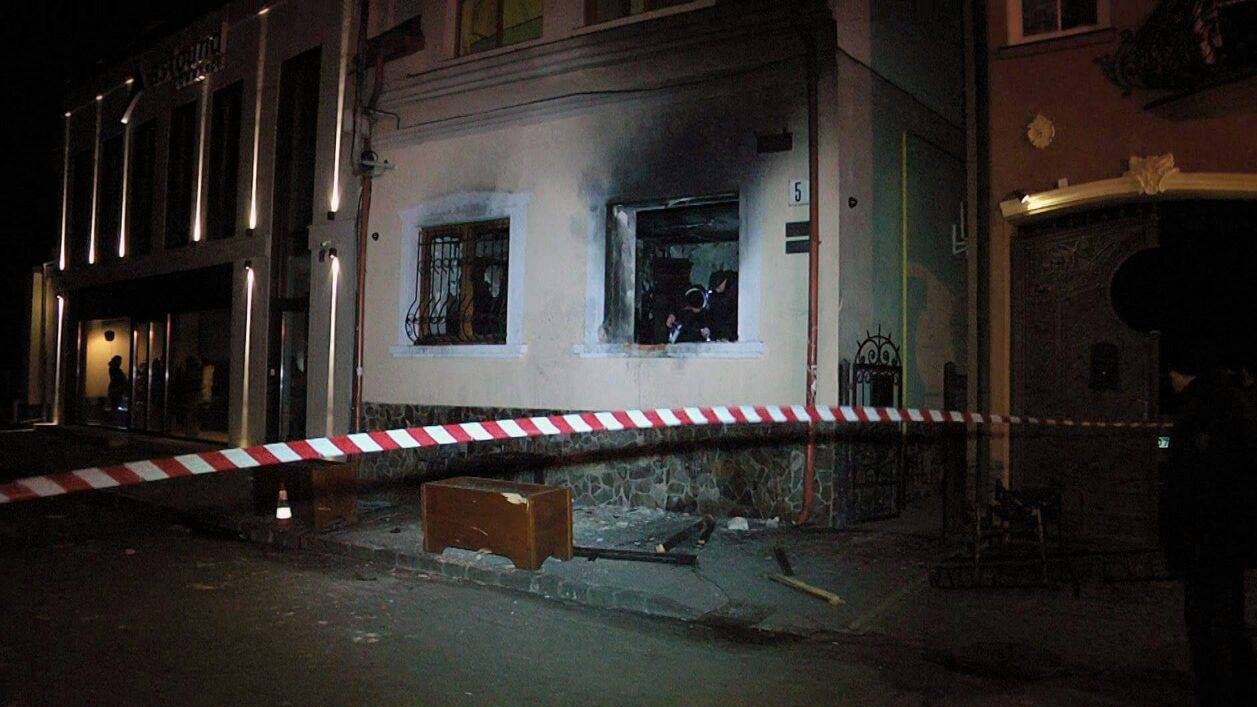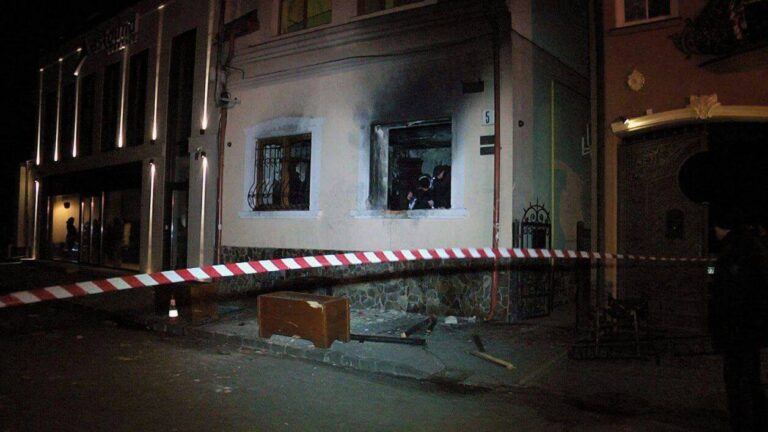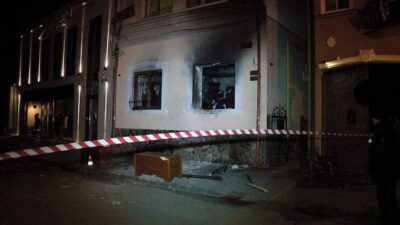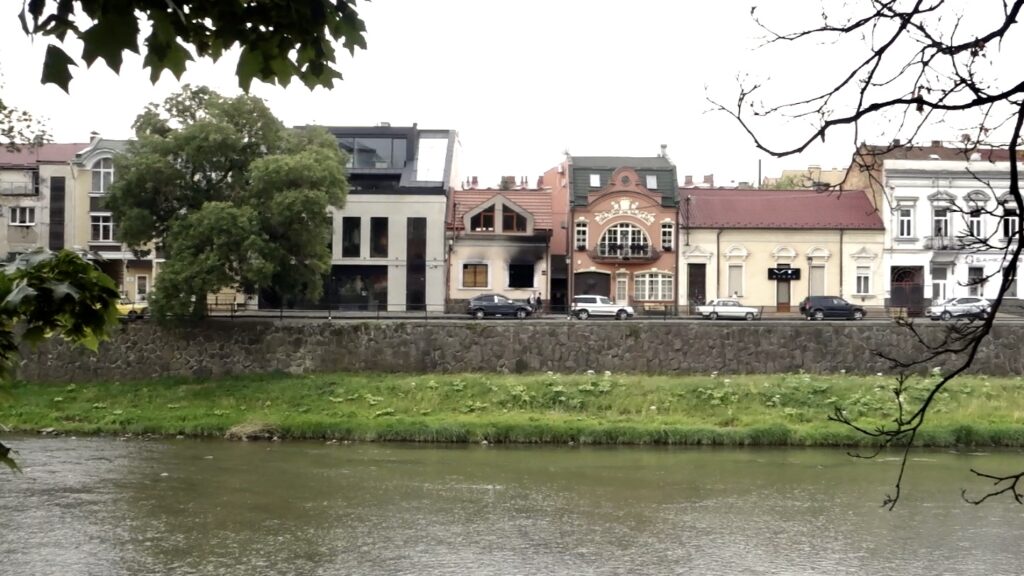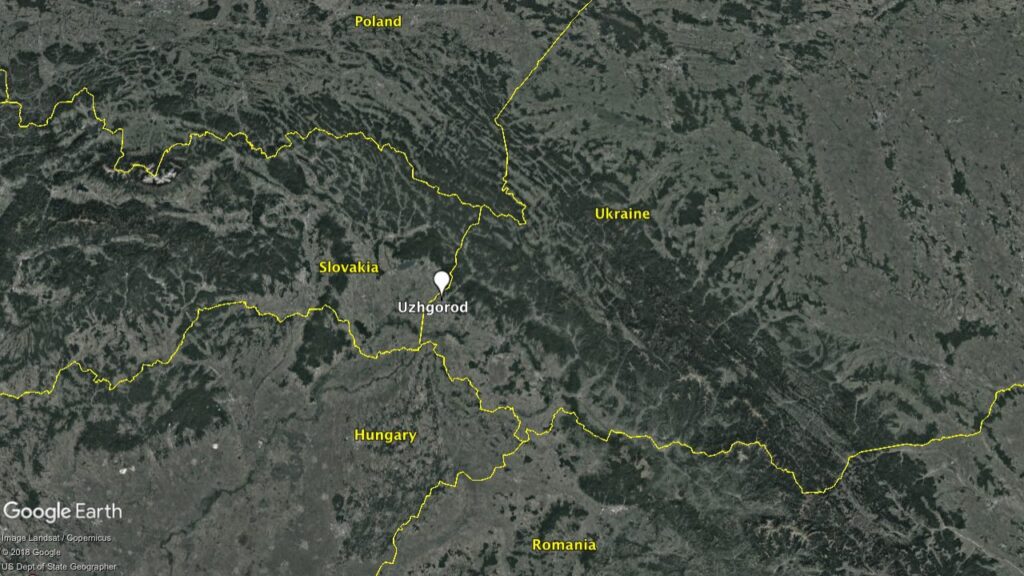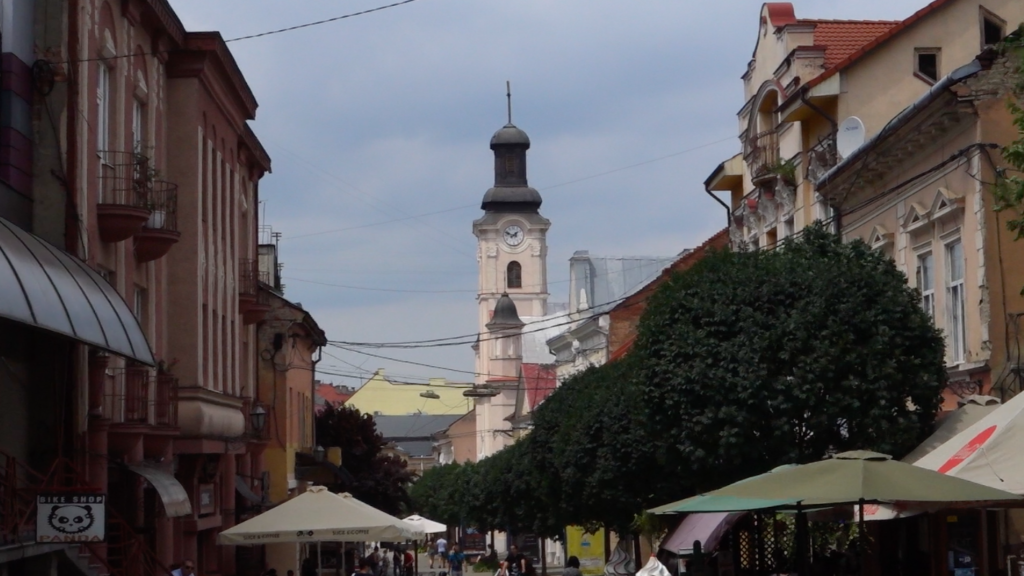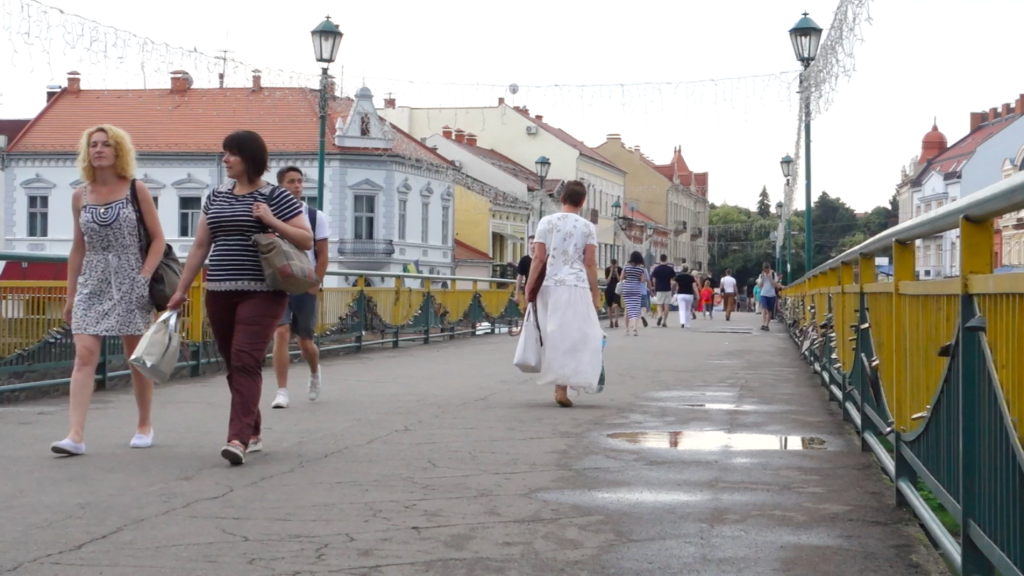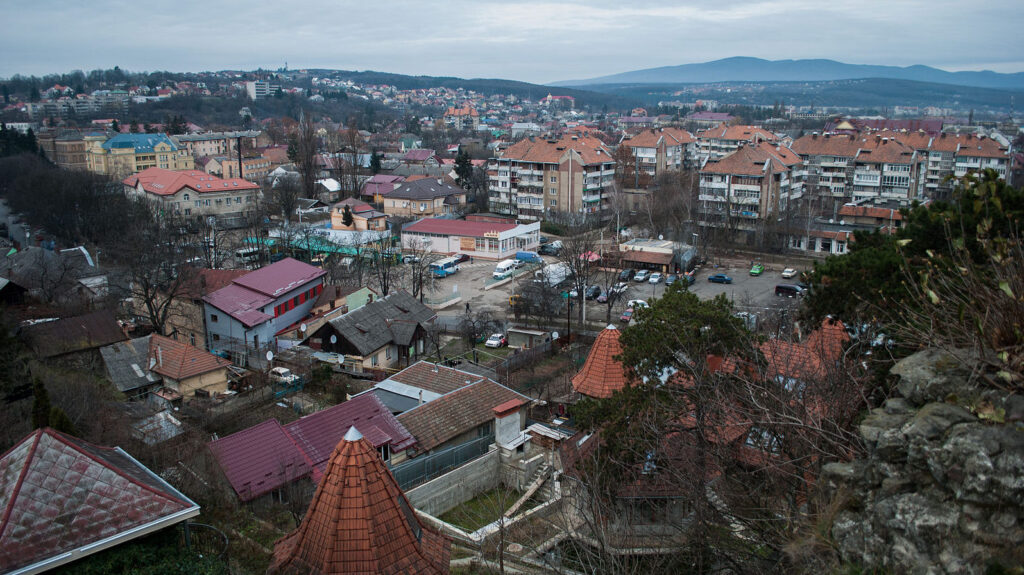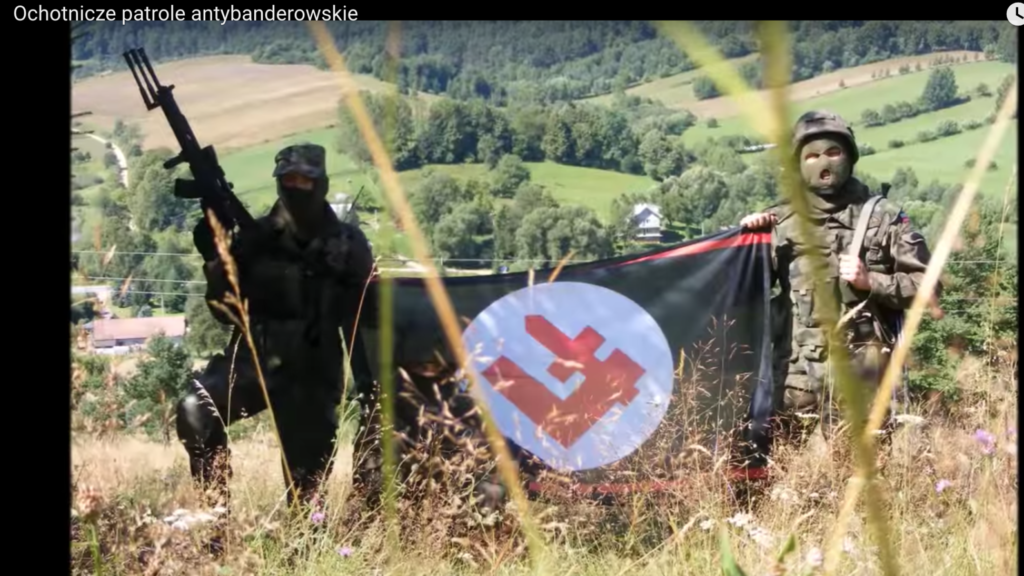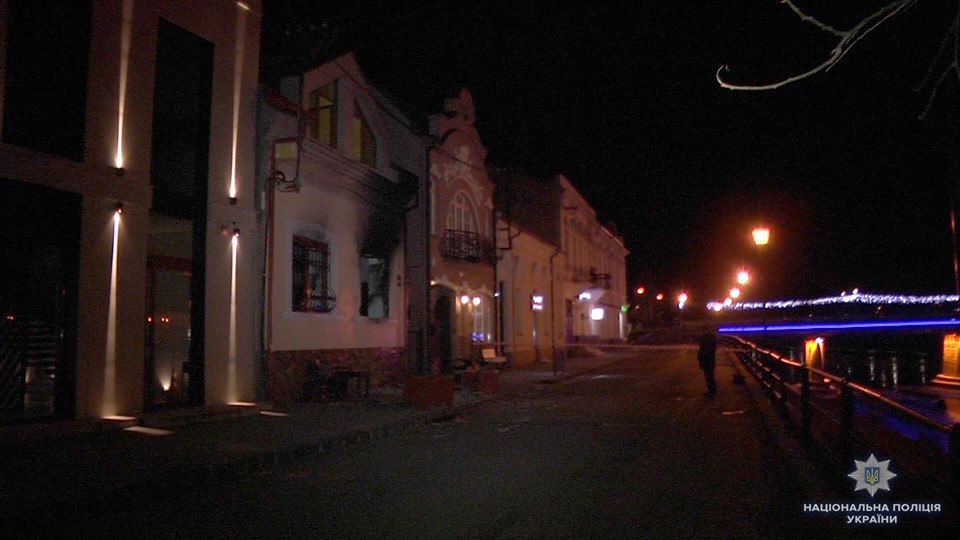Disguised as Ukrainian nationalists, three Poles set fire to the seat of Hungarian minority in Ukraine. It might sound like a scene from „The Olsen Gang”, but it is not – it really happened. The country that benefits from the arsons is Russia.
Authors: Anastasiya Moroz, Sebastian Klauziński, Szabolcs Panyi, Patryk Szczepaniak, Konrad Szczygieł (oko.press)
Uzhgorod, the town on the border between Ukraine and the European Union. It is February 4th, 2018, almost 1 a.m. Two men are walking along the Orthodox Boulevard, on the right bank of the Uzh River: Adrian M. and Tomasz Sz. They are carrying cloths soaked in flammable substances. Adrian, an electrician from Krakow, is stout, his hair cut short. Tomasz resembles his younger friend – he is wearing military clothes, and has a long beard. He’s a muscleman.
The Poles stop by the building number 5, which is the seat of the Hungarian Cultural Association in Uzhgorod (called „Hungarian house”). It is in the city centre, 100 meters from the Hungarian consulate, just by the footbridge over Uzh, which leads to Theatre Square, the town’s landmark. One of them set fire to the cloths and then try to do the same with the building. Another records everything with a phone. Moisture and low temperature make the task difficult, the facade of the building does not want to catch fire. The arsonists leave.
Adrian M. and Tomasz Sz. buy more petrol at a gas station. It is 4 a.m. when a CCTV camera records the return of the arsonists. In a video recorded by a surveillance camera of a nearby bank, one can see how they throw a bottle of petrol into the building’s window. They wait for the fire to appear. And then they leave.
Data from base transceiver stations on arsonists’ phones show that from the Hungarian house, they returned to Promenada hostel on Leo Tolstoy Street. Then they head to the main railway station in Uzhgorod. They board a bus that takes them to the border with Slovakia. After 6 a.m., two hours after the arson, they go through passport control. They are back in the European Union.
Shortly after the arsonists leave the area of the Hungarian house, fire brigade, police and the Ukrainian Security Service (SBU) appear on the site. The firefighters quickly extinguish the rather small fire. According to the Ukrainian investigators’ materials, which VSquare obtained, apart from the tarnished façade, the arsonists also painted a swastika on the wall. – There was no one in the building at night. It was in the morning when our neighbors noticed that something had happened and they called our representative, Josef Borto – says Vasyl Brenzovych (in Hungarian: László Brenzovics), president of the Cultural Association of Western Ukraine Hungarians, which owns the building.
– In the morning, the swastika was painted over by the Hungarians – reports Jaroslav Hasas, advisor to the Governor of Western Ukraine Oblast. – I suspect that if the police had not been notified, the incident would not have become public, as there was no major damage. Instead, in the morning the whole city knew about the event – the locals, Hungarian politicians and the consuls.
The arsonists made the work of the authorities easier, leaving traces of their presence in Uzhgorod at every step of their way: they shared real personal data in the hostel, let themselves be recorded by cameras monitoring petrol stations and banks, and finally bought tickets from a local carrier and showed their passports to the border guards before entering Slovakia.
The Ukrainian services quickly came to the conclusion that the arsonists were Polish. The Security Service of Ukraine (SBU) investigation got going. Superiors from Kyiv put pressure on the officers in Uzhgorod to find the perpetrators as soon as possible. The Polish Internal Security Agency joined the investigation.
Less than three weeks after the arson, Adrian M., Tomasz Sz. and Michał P. were detained by Polish services. The first two were charged with trying to set the Hungarian Cultural Association building on fire. Their principal, Michał P. was charged with financing an incident of terrorist nature. Adrian M. and Tomasz Sz. are at large. Michał P. remains in custody (in May, the court prolonged his temporary detention).
The three arsonists are connected to a far-right pro-Russian organization called Falanga (‘phalanx’ in English), which operates in Poland. For the Ukrainian services, it is one of the key proofs that Russia is behind the arson.
Budapest time
Uzhgorod is adjacent to Poland, Slovakia, Hungary and Romania. It is the westernmost and one of the poorest regions of Ukraine.
Historically, for 900 years it was part of the Kingdom of Hungary (later Austria-Hungary). After the Treaty of Trianon in 1920, which was traumatic for Hungarians as they lost almost two-thirds of their territory, it was part of Czechoslovakia for a short time. After WWII it became a part of the Ukrainian Socialist Soviet Republic. In the 20th century the region was of strategic value, as it lied on the border of the Soviet Union. It was home to its troops, rocket bases and a meeting place for KGB agents. Following Ukraine’s independence, this part of the country lost its importance.
The change of borders has left some marks: one in ten residents of the region is Hungarian. There are nearly 100 thousand of them living here, although quite a number left for the West.
The clock hands in some of the Hungarian homes in Uzhgorod move accordingly to the Central European time – an hour back compared to the Ukrainian time. It is a sign, a symbol, that the owners feel connected to the Hungarian fatherland.
According to the Ukrainian constitution, Hungarians can count on cultural and linguistic autonomy. Actually they are not demanding anything more. – The Hungarian minority is loyal to Ukraine and does not want to be considered separatists. Uzhgorod is not Lviv or Ivano-Frankivsk. There are no deep wounds between two nations, the locals have always lived in harmony, regardless of politics – says Dmytro Tuzhanskyi, a Ukrainian journalist and political scientist, dealing with Hungarian-Ukrainian relations.
But the situation of Hungarians in the area depends on who governs in Kyiv and Budapest. The Hungarian minority has its own parties – the counterparts of the two largest parties on the Hungarian political scene: the Social Democrats and Viktor Orbán’s Fidesz. The equivalent to the latter is the Transcarpathian Hungarian Cultural Association (KMKSZ).
The 2014 change of the head of the KMKSZ party showed that the local Hungarians do not like separatism. The previous chairman of the organization, Miklós Kovács, who publicly called for territorial autonomy, lost his position in favor of the amicable and peaceful Vasyl Brenzovych (László Brenzovics). Today, Brenzovych’s party is a coalition member of the strongest party in Ukraine – Petro Poroshenko Block – and Brenzovych himself is a deputy at the Supreme Council.
“Hungarians are better off here than we are” – Ukrainians from the area say. Although Ukraine does not permit dual citizenship, there is no penalty for Hungarians for having two passports. Additionally, the entire region is covered by the local border traffic regime. Those who work in Hungary earn several times more than people in Uzhgorod who do not leave the country for work. Those people also have Hungarian – higher – pensions. In addition, Budapest financially supports the diaspora, and KMKSZ receives several hundred thousand dollars a year from the Hungarian budget.
The Hungarian minority is well organized. In Berehove, 70 km from Uzhgorod, where the Hungarians are most numerous, there is a university with Hungarian as teaching language. The Uzhgorod National University also has some departments that use Hungarian during lectures. – Hungarians are poorly integrated with Ukrainians, they do not speak Ukrainian well. It is rather an unusual situation that a large part of the people living in the border region do not speak the national language – says Tadeusz Iwański, an expert on West Ukraine from the Warsaw-based Centre for Eastern Studies.
In 2012 the Verkhovna Rada of Ukraine passed a law on state languages (”On the principles of the state language policy”), which gave Russian equal status to that of Ukrainian – in most of the regions of Ukraine. The law was passed by President Yanukovych’s pro-Russian Party of Regions. The Hungarians in West Ukraine also benefited from the law as Hungarian was officially made a regional language in Berehove.
However, in February 2018 the Constitutional Court of Ukraine ruled the law unconstitutional. Ukraine then adopted a new law on education. This time it was about strengthening the Ukrainian language. Still, both laws had Russian as their point of reference. And just like the Hungarians gained from the previous law, they lost from the new one.
Other countries affected by the law on education, such as Poland, have signed a memorandum with Ukraine and the issue blew over. It seems that a similar scenario will happen in Romania as a compromise is due to be announced soon. In the case of Hungary, Budapest did not want dialogue from the very beginning and reacted very sharply. Foreign minister Péter Szijjártó announced that in retaliation he would block Kyiv from integrating with the European Union and NATO.
A crack
A serious crack in relations between Hungarians and Ukrainians in the region appeared in 2014. After Fidesz won the elections in Hungary, Prime Minister Viktor Orbán said in parliament that Hungarians from Zakarpatsk region should have the possibility of dual citizenship, as well as the possibility of forming their own self-government. He talked a lot about autonomy: „Those are our requirements for the new Ukraine, which has just been established.”
He was referring to Ukraine after the Maidan revolution in Kiev and the removal of Viktor Yanukovych from the office. The autonomy was also mentioned by the Deputy Prime Minister and the Head of the Hungarian Ministry of Foreign Affairs. The moment when they were discussing the issue was unfortunate: two months earlier, Russia started its occupation of Crimea.
Orbán’s words caused consternation in Ukraine. The new authorities, occupied with a war in the east of their country, had no strength to take care of Zakarpatsk region. It all ended with a protest note, which went unnoticed. – The result was a mismatch. When one country suddenly takes an interest in the border region of a neighboring country and the headquarters of that country do not respond, there is tension – says Tuzhanskyi, a journalist from Uzhgorod.
The Hungarians in the area see it differently. We’re meeting Vasyl Brenzovych (László Brenzovics), the head of KMKSZ, in a new seat of the party, where the association of Hungarians moved after the fire. The building is in the town centre and newly renovated, scaffolding still standing by the windows. It has several floors and a CCTV camera – and a security guard – at the entrance. – In the past, the central authorities were not much involved in the affairs of the Hungarians in the region, and if so, those were positive actions. Everything changed in 2014. There was not a single month without negative materials, in which Hungarians were accused of separatism. Those were complete lies – Brenzovych complains.
Information war
– Information war between Russia and Ukraine started in 2014. Suddenly, the biggest Russian media began to take an interest in West Ukraine. RIA Novosti and TASS wrote about Berehove, where the Hungarian minority lives. Where is Russia and where is Berehove, a town of 24 thousand inhabitants? – Tuzhanskyi wonders.
Russian media post fake news, for example a video from Hungarians’ meeting somewhere in Zakarpatsk region, with a comment: “The Hungarians have just enacted autonomy”. Many Ukrainians were persuaded by the fakes. The word “autonomy” is badly associated in Ukraine – as for its people “autonomy” means Donbass.
Initially, Russian media mainly covered the Ruthenians, another Zakarpatsk region minority.
In November 2016, international media wrote about the documents that Ukrainian hackers supposedly stole from the mailbox of Vladislav Surkov, an advisor to the Russian President. The documents included, among other things, a plan called “Shatun”: it assumed destabilization of the situation in West Ukraine from November 2016 to March 2017. According to the plan, the Ruthenians were to be used for throwing a spanner in the works of Ukraine. The SBU found the documents credible, but experts still have doubts as to whether they are real or not.
The people we talk to in Uzhgorod believe that the Shatun plan was authentic but was dashed to the ground. Therefore, when an opportunity arose, Russia’s propaganda machine began to manipulate the issue of the Hungarian minority instead of the Ruthenians.
Brenzovych hurries to take a train to Budapest, but before he leaves, he shows us a brochure. Inside is a summary of all attacks and provocations against the Hungarian minority since 2014. Only in 2017, Brenzovych counted 89 of them: burnt monuments, Sándor Petőfi’s statues painted over, tearing down of Hungarian flags, spreading fake leaflets and sharing fake news about the preparations for a military assault of Hungarians in Zakarpatsk region.
A few months ago, VSquare spoke to Csaba Papp, a Hungarian businessman. Papp worked with the Hungarian Parliament and the Chancellery of the Prime Minister in 1996-2002, after which he maintained business contacts with Russian and Ukrainian partners in the energy and arms sectors. According to him, the former KGB head and Russian Prime Minister Yevgeny Primakov, mentor of Vladimir Putin, developed a foreign policy strategy based on similarities between Russia and Hungary: Hungary can be used as a proving ground to test Russia’s aspirations. This strategy is based on the assumption that Russia and Hungary are both surrounded by countries and territories that once were part of them, remnants from the ‘imperial’ past. – The Russian and Hungarian minorities both live in homogeneous blocks, more or less deprived of political, cultural and linguistic rights. That is why Russia is particularly interested in the rights of the Hungarian minority – Papp explains.
Attila Demkó worked for 16 years in the Hungarian Ministry of Defence and was the head of the Defence Policy Department. In February 2018, he left the ministry and published a political fiction novel under the pseudonym David Autere. In his book, Putin’s Russia incites ethnic conflict between Romanians and the Hungarian minority living in Transylvania.
In a recent interview for the Hungarian portal Index.hu, Demkó admitted: – This is a hypothetical scenario: let’s assume that Romania starts cracking down heavily on minority rights. It’s obvious that, in reality, the situation is not as bad as it was under Ceaușescu. But we have seen in Ukraine that previously granted rights can be withdrawn without much international concern.
– The Russians are using the ‘Hungarian card’ in Zakarpatsk. Russian websites are irritating Ukrainians with Transcarpathian secession efforts when there are no such efforts coming from the Hungarians. And it is nonsense since barely 12 percent of West Ukraine’s population is Hungarian. But it is an old technique to utilize a minority to weaken another country – the former head of the defence policy department claimed in the interview.
Falanga supports Russia
Falanga is a Polish, radically right-wing organization, referring to the tradition of the pre-war, nationalistic and anti-semitic Obóz Radykalno- Narodowy Falanga (National-Radical Camp Falanga). It is characterised by aversion to the USA and NATO and admiration for Putin’s policies. Falanga is not formally registered.
25-year-old Tomasz Sz. from Bydgoszcz, one of the arsonists from Uzhgorod, is a sympathizer and activist of Falanga. He is also the editor of Xportal.pl, a website, that gathers Falanga’s supporters and activists. He is a prolific author, during only three weeks (from the February 4th, the day of arson attack, until 21 February, when he silenced) his texts were published in Xportal every day. Tomasz Sz. also acts as an expert on the pro-Kremlin Sputnik radio, translates Alexander Dugin’s interviews for Xportal and publishes photos and graphics of Nazi symbols on his Facebook profile. Tomasz Sz., as a representative of Xportal, went to Sochi, Russia, for the International Students and Youth Festival in 2017.
Mastermind of the Uzhorod attack, who directs the operation from Poland, 28-year-old Michał P., is associated with the pro-Kremlin party Zmiana. Its head, Mateusz P., is in custody, accused of espionage for Russia (read our story). Michał P. used to appear at anti-Ukrainian demonstrations in Poland, including November 2nd, 2014, when he protested together with the pro-Russian “Ukrainian Committee” at the Ukrainian Embassy in Warsaw. He devoted a lot of his time to the military group Jednostka Strzelecka 2039 (Shooting Unit 2039, SJS 2039), which has been for years cooperating with the Polish Ministry of Defence.
It was probably the Shooting Unit 2039 where Michał P. met Adrian M., a 22-year-old, also a member of the unit. Michał P. is the commander of one of the platoons and a member of the association’s audit committee. Adrian M. is a regular, he is a member of the unit since 2016.
The Falangists of the SJS 2039 organised “anti-Bandera” patrols on the Polish-Ukrainian border. They travelled to the separatist People’s Republic of Donetsk for meetings with its leaders, burnt NATO flags at rallies in front of the US Embassy and shouted anti-Semitic slogans (read more – in Polish)
On Xportal.pl it’s still possible to watch a movie from August 2015: showing armed men organize an anti-Bandera patrol at the Polish-Ukrainian border (the film, which the Falangers boast of, was later broadcast on Russian NTV). A scene from the movie shows a group of volunteers crossing the Polish forests on the border with Ukraine „in search of Right Sector fighters”. According to Marcin Rey, an activist and founder of the “Russian Fifth Column in Poland” Facebook website, anti-Bandera patrols were created, among others, by members of the 2039 unit, with Michał P. among them.
SJS 2039 is subordinate to the Association of Shooting Units from Rzeszów. The organisation acts officially under the patronage of the Polish Ministry of Defence. In 2016, the unit took part in the Regional Defence Exercises over Solina lake, organised as part of NATO’s Anaconda exercises. Since September 2016, the Military Property Agency (related to the Ministry of Defence) leases a military property in Krakow to SJS 2039. The Foreign Intelligence Agency is one of the founders of the association’s official banner . Shooters from SJS 2039 can be seen at many events and parades with the participation of Ministry of Defence and local government officials.
In February, just after the arsonists were arrested, we asked the Internal Security Agency (ABW) whether they were aware of the relationship between Adrian M., Michał P. and other Falanga activists and the SJS 2039 association. Has the ABW, which is supposed to be responsible for state security, done anything to cut the cooperation between the SJS 2039 and the Ministry of Defence? The press spokesman for the Minister of Special Services, Stanisław Żaryn, redirected us to the Ministry of Defence.
So we asked the Ministry of Defence: how is it possible that the Ministry and its institutions cooperate with the activists of the neo-fascist and pro-Kremlin organizations? The press office of the Ministry responded vaguely: “There is no formal document regulating the cooperation of the Ministry with SJS 2039”.
Zbigniew Mirosław from Kraków’s Shooting Unit claims that – after the first publications in Poland in November 2016 on the links between Kraków’s SJS 2039 and Falanga, the ABW called for the interrogations of participants in pro-Russian demonstrations. There was no evidence that they were connected to any Russian or pro-Russian link. Marek Matuła, the commander ofShooting Unit in Rzeszów, claims that before entering into an agreement with his colleagues from Kraków, he asked “for an appropriate security service to check SJS 2039 for compliance with the Polish legal system”. They replied that they ‘had no objections’.
We have tried to contact Adrian M., the arsonist from Uzhgorod, the only one out of all three not in custody. – I have already read enough stupid things about myself on the Internet – he briefly ended our telephone conversation.
Hungarians, decide!
Bartosz Bekier meets us in the elegant lobby of the Polonia Hotel in the centre of Warsaw. We sit by a glass of lemonade and a window overlooking the famous Palace of Culture. That’s Bekier, the leader of the far-right pro-Russian organization Falanga, who chose the place for the meeting.
What does he do for a living? — I am a lecturer at one of the private universities – he answers mysteriously. At which one? The Falanga leader will not disclose that secret. Previously, as a doctoral student, he was a lecturer at the Cardinal Stefan Wyszyński Public University in Warsaw. He was teaching classes on state security and decision making games. When he was recently described as a Russian influence agent in Poland, the university had to publicly explain itself for Bekier’s employment. This may be a reason for Bekier’s reticence: he doesn’t want his current employer to get in trouble.
Where does Falanga get the money from? Bekier smiles: — From readers’ contributions. We organize private donations on a crowdfunding portal, you can also pay directly into our account.
Whose account does the deposit money go to? Bekier answers that it is an account created for his private needs, but assigned to Xportal.pl.
The Falanga is not a foundation or association, not even a legal entity. There are no accounts or activities of the organisation in the court register. — The court has been blocking our registration for many years, probably for political reasons. The organization’s name itself, which refers to the pre-war Falanga, may be a problem for the legal elites — says the leader of Falanga.
Bartosz Bekier travels a lot. He was in Syria with activists from the pro-Russian party Zmiana, in Lebanon with representatives of Hezbollah and with separatists in the People’s Republic of Donetsk. „I travel on my own money. It’s not ‘Putin Travel’, as hostile media describes” says the leader of Falanga. He argues that the Polish secret services are acting very efficiently, so they would quickly discover if anyone from the East contributed to his travels.
Bekier believes that the arson in Uzhgorod has nothing to do with Falanga.
– It was their own, arbitrary action – he says. Bekier calls some of the information about the arson that appeared in the Ukrainian media as fake–news: – The appearance of my name in the articles on the arson in Uzhgorod and the stories of my participation in the battles in Donetsk, or being the commander of a legion of volunteers against the Ukrainian state, show that the Ukrainians set the context of the narrative far in advance.
Bekier speaks confidently, quickly, as if he was reading from a prompter. When the arsonists returned from Uzhgorod, did they make any contact? – Yes, I talked to them. To the very end they denied that they were the perpetrators – he says.
How does he explain the action of the Falangists? – I don’t see any potential profits for Falanga from such an action – says Bekier. In his opinion, it might have been a provocation of the SBU — when Michał P. came back to Poland, he told Bekier that exact version. Apart from the potential benefits of the Russian side, it was Ukraine that benefited the most from the Falangists’ action, he believes and asks: What if the Ukrainian nationalists were the ones carrying out an initial attack against the Hungarian minority, and then the Ukrainian authorities came up with a plan to transfer the blame to Poles or Russians?
After the arsonists were caught in Poland by the Internal Security Agency (ABW), both Kraków’s Strzelec and Falanga officially denied any connection with the attack in Uzhgorod. Michał P. was dismissed from Strzelec. Falanga announced that they had nothing to do with the action, but the article about the arson published in Xportal sounds like one dictated by Russia. It calls “all groups that feel connected to national radicalism, nationalism or other interpretations of the national idea to join (…) the statement in order to initiate a debate in Poland on the international status of West Ukraine”. The authors of Xportal also encouraged the Hungarian minority to decide for themselves “which country their small homeland should be a part of”.
Budapest, Moscow, Washington
From the Polonia Hotel in the centre of Warsaw it is 500 kilometres to Uzhgorod, and more than 7 thousand kilometres to Washington DC. However, it is the United States that will become both a key player and an important stage in the debate between Hungary and Ukraine about Zakarpatsk region. The story of Falanga’s attack in Uzhgorod was reported to American decision makers in Washington a few months ago, VSquare has learned. And if the arson of the minority house in Uzhgorod was to trigger a stronger reaction, its culmination took place in the US capital.
In April 2018, Vasyl Brenzovych, head of the Cultural Association of Zakarpatsk Hungarians visited Washington DC to raise the issue of anti-Hungarian measures in Ukraine with US officials and policymakers. His trip and lobbying effort was partly organized by the Embassy of Hungary, partly by the Hungarian American Coalition (HAC), a Hungarian interest group supportive of the Orbán government and receiving funds from the Hungarian state. Brenzovych didn’t speak English. It was an official from the Hungarian Prime Minister’s Office who helped him around and took the role of the interpreter on some of his meetings, a source who met Brenzovych in Washington told us.
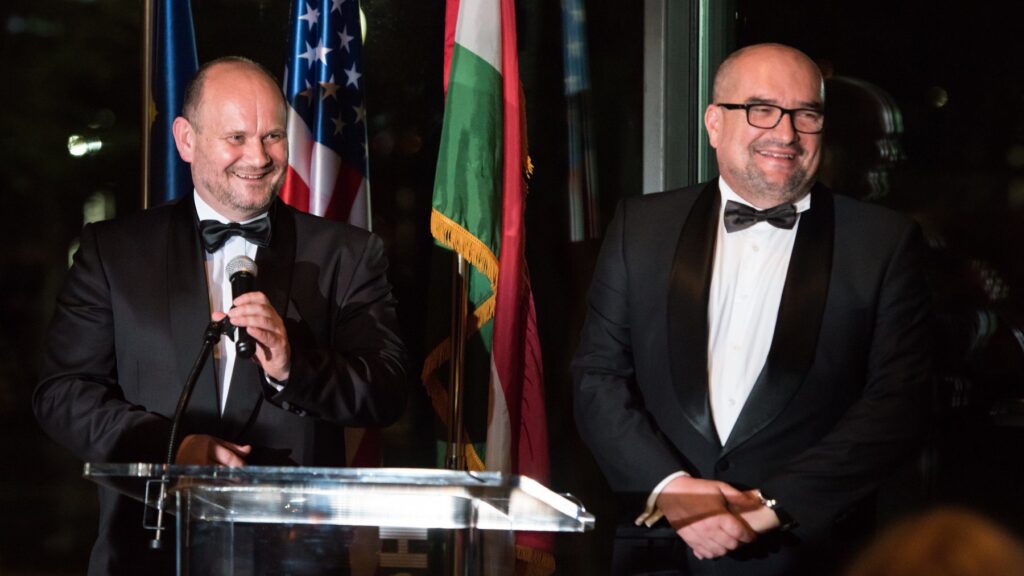
Right: Vasyl Brenzovych (László Brenzovics), left: György Kóta (consultant to PM Viktor Orban)| Photo: Facebook/Hungarian American Coalition
As it seems from an official report published on the HAC website, the representative of the Hungarian minority in Zakarpatsk didn’t provide a full picture of the Uzhgorod attacks. Brenzovych, while talking with US partners, solely blamed Ukrainians for the anti-Hungarian attacks, even for the incident in Uzhgorod. “Ukrainian public figures publish hostile and accusatory statements that stigmatize the Hungarian minority and other ethnic groups and embolden extremist Ukrainian nationalists, whose anti-Hungarian attacks – including acts of vandalism and a terrorist attack against the Hungarian Cultural Alliance headquarters earlier this year – have sharply increased in recent years”, Brenzovych said, according to the report. A source present at that speech confirmed that there was no mention of the Polish perpetrators, neither their alleged pro-Kremlin ties.
Two weeks later, senior foreign policy officials of the Trump administration weighed in on the Hungarian-Ukrainian debate. On May 15th, Orbán’s chief foreign policy advisor Jenő Megyesy had talks with John Bolton, Donald Trump’s national security advisor. Sources who were briefed on this meeting told us that Bolton’s main concern was Hungary’s blocking of Ukraine’s NATO ascension, in retaliation for the new Ukrainian education law. The US position is that this conflict has nothing to do with NATO, hence it shouldn’t be debated on NATO level. The Hungarian position, on the contrary, is that the protection of minorities is required by NATO rules too.
The same issue was raised a week later by Assistant Secretary of State Wess Mitchell during his visit to Budapest. Mitchell, who is said to be trying to steer back to a normal US-Hungarian relationship, offered a Trump-Orbán side meeting and a photo op in Brussels during the NATO Summit if Hungary ‘unblocks’ Ukraine’s NATO ascension in return, Hungarian and US sources confirmed to us. The offer was rejected. Partly because the Orbán government believes it would have signaled weakness not only in relation to Ukraine, but also in relation to other neighbouring countries with a large Hungarian population, where Budapest is fighting for the rights of its minority.
Something similar happened with Secretary of State Mike Pompeo and Hungarian foreign minister Péter Szijjártó. The two met in Washington DC on May 30 – the first bilateral meeting on this level since 2012 – which didn’t result in a joint press conference. In order to put pressure on the Hungarians, Pompeo only agreed to a press conference on the condition of Hungary revising its position on Ukraine, so that he can announce it together with Szijjártó, Hungarian and US sources both confirmed to us. This didn’t happen either. – We won’t back down and abandon this issue, neither for a photo opportunity with Trump, nor for a joint press conference, this is not what it is all about – a source working with the Hungarian foreign ministry told us. Several Hungarian government sources with whom we have spoken say that Ukrainian officials are unreliable and untrustworthy. Therefore, Budapest will continue to exert pressure on Kiev on the issue of Hungarian minority rights.
Among Democrats and left-wing circles, as well as in part of the bureaucracy of the State Department, Hungary’s hostility to Ukraine is causing a reaction: accusations of Budapest’s cooperation with Moscow. In October 2017, when discussing Hungary’s action against Ukraine as a retaliation for the Education Act, a high-ranking official in the regional bureau of the State Department openly told Hungarian diplomats that the Orbán government appeared to echo Russian talking points, according to a source familiar with the content of the conversation.
Senator Ben Cardin, ranking Senate commissioner on the U.S. Helsinki Commission made a statement in May 2018 also raising the issue of “Hungary’s opportunistic approach to Ukraine following Russia’s 2014 invasion, with Hungary’s rhetoric often echoing Moscow’s”. The Senate Democrat continued by saying that “overall, the Hungarian Government’s approach suggests that it is not interested in a dialogue about the Hungarian minority in Ukraine, but in finding a new political enemy. The fact that this is music to Vladimir Putin’s ears may be just a coincidence.”
However, Trump’s administration officials see Hungary’s actions in a slightly different way, diplomatic sources from both countries told us. A common view in the administration seems to be that Hungary’s blocking of Ukraine’s cooperation with NATO is of course beneficial to Russia, but it’s not the reason behind it. Another opinion is that Hungary uses ‘nuclear tactics’ partly because it finally wants attention from the US after years of terrible relations under Barack Obama. The Hungarian prime minister is also believed to simply think that it is a necessity to always have a geopolitical buffer between Europe and Russia, and that is Ukraine. This position on Ukraine was described to us by multiple US sources either as ‘cynical’ or ‘realist’, but not as pro-Kremlin.
When we ask one of the senior officials of the Hungarian Ministry of Foreign Affairs and Trade about the attacks in Uzhgorod and possible Russian ties, he cuts them down: – Two attacks took place, one of which was carried out by Ukrainians – the source replies. Was the Ukrainian question raised at the last foreign ministers’ meeting in May between Szijjártó and Sergey Lavrov? – I don’t know if they talked about it, but the Russians certainly don’t have any influence on Hungary’s position – the senior official said.
In April, Hungarian foreign minister Szijjártó strongly rejected similar accusations at the NATO summit of foreign ministers: – It is a lie that Hungary has been commissioned by Russia to pursue its Ukraine policy. We reject in the strongest possible terms and are extremely offended by the campaign of lies that Ukrainian politicians have launched, according to which Hungary’s Ukraine policy is determined by Russia in some way – Szijjártó said.
Concealed identity
What is the second attack our Hungarian foreign ministry source was talking about? After Falanga activists tried to set the “Hungarian house” on fire, a second, more serious attack took place on February 27th. This time, the attackers used a home-made bomb, made out of aluminium. Nobody was injured, but as a result of the explosion the interior of the building burnt down, and with it, the documentation of the Hungarian association, too. The perpetrators of the attack were two Ukrainians, led by a Ukrainian citizen with a passport from Transnistria, a para-state controlled by Russia. – Information about the explosion immediately appeared in Russian media, including TASS [Russia’s central information agency – ed.], even before the Ukrainian media started to talk about it – says Jarosław Hałas from the office of the Governor of the Uzghorod area.
SBU classified it as a terrorist act. Two Ukrainians were arrested, the third one with a Transnistrian passport managed to escape.
Brenzovych claims that he is not sleeping peacefully anymore: – Two days before our meeting, Ukrainian police have arrested a group of people from Mukachevo who had come to Uzhgorod in a car full of explosive devices. They did not have a credible explanation for what reason they brought this material to Uzhgorod. There was police standing near my house.
Ukrainians claim that nationalists in Zakarpatsk region do not have much to say here. – Those who take part in the demonstrations are ‘imported’ nationalists from Lviv and Ivano-Frankivsk. Dmytro Tuzhanskyi points out that there is a difference between nationalists from the Right Sector and extremists from the right wing group called Zakarpatská Sich. It is a marginal group, with a small circle of friends and management. They carry out political orders, but not only that. If someone has a business problem, they can also turn to them – says Tuzhanskyi.
We ask Jaroslaw Halas, advisor of the Governor of the Zakarpatsk region, about Ukrainian nationalists: – The right–wing in Zakarpatsk region is Russia’s enemy. Many of them fought in Donbass against them. They do not like Hungarians, but they try to communicate with them. They are not looking for conflict – the advisor says.
– The Ukrainian-Hungarian conflict is artificial, everyone in the region knows it. The truth is that for $200 you can do any kind of propaganda action here. And then film it and send it to Russian media -Tuzhanskyi says.
Ferenc Katrein worked for the Hungarian counter-intelligence (NBH, later AH) for a decade until 2014. After leaving the service, he publicly criticized the Orbán government’s approach to Russian intelligence activity in Hungary. – The attackers in Uzhgorod were Polish citizens with ties to pro-Kremlin far-right circles. I believe that the ‘Polish connection’ was used to hide the identity of the real preparators so that they can avoid consequences – Katrein told us. – It is likely that some attackers and most of the members of these extreme right-wing groups knew little about the real background of those who masterminded these actions – he continued.
In Katrein’s opinion, a possible ethnic conflict involving Hungarians in Zakarpatsk region is one of the biggest challenges that the Hungarian intelligence community has to face and prevent right now.
This story was reported and published in cooperation with oko.press.
VSquare’s Budapest-based lead investigative editor in charge of Central European investigations, Szabolcs Panyi is also a Hungarian investigative journalist at Direkt36. He covers national security, foreign policy, and Russian and Chinese influence. He was a European Press Prize finalist in 2018 and 2021.
Ukrainian journalist, since 2017 working at the Fundacja Reporterów (Reporters Foundation). Based in Warsaw.
Konrad Szczygieł is an investigative journalist at FRONTSTORY.PL. Previously, he was a reporter at Superwizjer TVN and OKO.Press. Since 2016, he has worked with Fundacja Reporterów (Reporters Foundation). He was shortlisted for a Grand Press award (2016, 2021) and an Andrzej Woyciechowski award (2021). He is based in Warsaw.

